2.4 — History of Trade II: Mercantilism
ECON 324 • International Trade • Fall 2020
Ryan Safner
Assistant Professor of Economics
safner@hood.edu
ryansafner/tradeF20
tradeF20.classes.ryansafner.com
From Medieval to the Proto-Modern World
The Peace of Westphalia (1648)

The Black Death I

The Black Death I

Bubonic plague ravages Europe (esp. 1340s-1350s)
75-200 million die (30-60% of European population)
Absolutely enormous social, political, economic consequences
- Some good in the long run??
North, Douglass C. and Robert Paul Thomas, (1973), The Rise of the Western World: A New Economic History, p 12-13
The Black Death Consequences I

Reverses the effects of the Commercial Revolution from decimated population
Real wages increase, real rents decrease, agricultural prices decrease
Drastic shift in bargaining power from lords to peasants
- Peasants gain longer leases and more direct property rights in land
Scarce labor → incentive to seek out labor-saving innovations
North, Douglass C. and Robert Paul Thomas, (1973), The Rise of the Western World: A New Economic History, p 12-13
The Black Death Consequences II

King Richard II executing Wat Tyler, leader of the Peasants Revolt
Lords attempt to force a return to "normal"
1351 Statute of Laborers in England: fix price controls, force down wages
- Leads to Peasant Revolt (1381)
Manorialism fades away slowly, Lords and peasants need more flexibility in prices and contracts to change with circumstances (not immutable custom)
- Peasants become more "indepedent contractor" than feudal serf
North, Douglass C. and Robert Paul Thomas, (1973), The Rise of the Western World: A New Economic History, p 12-13
Other Key Historical Events: The Reformation I
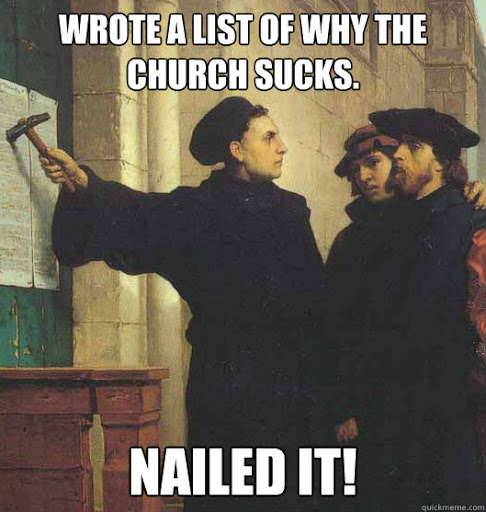
Printing press emerges in Europe around 1450 via Johannes Gutenberg in Mainz
- Prints the first "Gutenberg Bible"
Martin Luther publishes 95 Theses against the Catholic church in 1517 Wittenberg
Luther is far from the first Christian dissident
- But he is the first to "get away with it"
- protected by a powerful group of disgruntled lords away from Emperor Charles V
- plus he has a printing press!
Other Key Historical Events: The Reformation II

Over 300 years, religious wars overlaid political & military competition between early European states. Some of the most devastating until WWI.
Other Key Historical Events: The Age of Discovery I

Byzantine Empire falls in 1453 to Ottoman Turks, which cuts off Europe's access to the Eastern trade; search for sea-routes to India and China begin
Other Key Historical Events: The Age of Discovery II

Other Key Historical Events: The Age of Discovery III

Trade (and later colonization) with world is immensely profitable
"Discovery" of New World & Atlantic trade
- Colonies ship raw materials back to Europe in exchagne for manufactured goods
Other Key Historical Events: The Age of Discovery IV

Europe recovers from the Black Death, population growth from economic improvements
Land-abundant, labor-scarce colonies are an "escape valve" for Malthusian pressures in land-scarce, labor-abundant Europe
Also an escape valve for some religious dissident groups (Puritans, Protestant Dissenters, Quakers, etc.)
Other Key Historical Events: The Age of Discovery IV

The Amsterdam Stock Exchange (1601)
Towns become specialized and very wealthy cities
“The Middle Class” emerges in terms of wealth, power, and social status
- “Freemen”, not peasants tied to the land
- But not big landowners or aristocratic nobles
Small-property-holding townspeople growing wealthy from manufacturing, shipping, or colonial trading ventures
Mercantilist Europe (c.1500-c.1800)
Mercantilism I

Feudalism fades away slowly: feudal custom and obligatory service replaced by cash payment and flexible contracts
Rising merchant class grows outside of landlord-serf & patronage-dominated customs
- in some countries (Netherlands & England), become part of the elite
A new political-economic ideology of nationally-managed trade to replace feudalism: mercantilism
Mercantilism: The Rise of a New Class I


Mercantilism: The Rise of a New Class II

Karl Marx (1818-1883)
Friedrich Engels (1820-1895)
"The feudal system of industry, in which industrial production was monopolised by closed guilds, now no longer sufficed for the growing wants of the new markets. The manufacturing system took its place. The guild-masters were pushed on one side by the manufacturing middle class; division of labour between the different corporate guilds vanished in the face of division of labour in each single workshop," (§2 Proletarians and Communists)
Marx, Karl and Friedrich Engels, 1848, Manifesto of the Communist Party
Mercantilism: The Rise of a New Class III

Karl Marx (1818-1883)
Friedrich Engels (1820-1895)
"The bourgeoisie, wherever it has got the upper hand, has put an end to all feudal, patriarchal, idyllic relations. It has pitilessly torn asunder the motley feudal ties that bound man to his "natural superiors," and has left remaining no other nexus between man and man than naked self-interest, than callous "cash payment." It has drowned the most heavenly ecstasies of religious fervour, of chivalrous enthusiasm, of philistine sentimentalism, in the icy water of egotistical calculation. It has resolved personal worth into exchange value, and in place of the numberless indefeasible chartered freedoms, has set up that single, unconscionable freedom---Free Trade," (§2 Proletarians and Communists)
Marx, Karl and Friedrich Engels, 1848, Manifesto of the Communist Party
Mercantilism: The Rise of a New Class IV

Karl Marx (1818-1883)
Friedrich Engels (1820-1895)
"The bourgeoisie, during its rule of scarce one hundred years, has created more massive and more colossal productive forces than have all preceding generations together. Subjection of Nature's forces to man, machinery, application of chemistry to industry and agriculture, steam-navigation, railways, electric telegraphs, clearing of whole continents for cultivation, canalisation of rivers, whole populations conjured out of the ground---what earlier century had even a presentiment that such productive forces slumbered in the lap of social labour?," (§2 Proletarians and Communists)
Marx, Karl and Friedrich Engels, 1848, Manifesto of the Communist Party
Mercantilism as a Political-Economic Ideology I

What does the new merchant class want?
Commerce! Trade!
But not just any commerce...like any self-interest elite, they want commerce favorable to themselves
- Monopolies, privileged terms of trade
Mercantilism as a Political-Economic Ideology II

Nation-states (monarchs) as principle actors
National economies, stimulated by activist State interventions
The wealth of nations is the quantity of their "specie" (gold and silver; i.e. money)
- More money ⟹ hire more soldiers ⟹ win more wars ⟹ gain more wealth
Mercantilism as a Political-Economic Ideology III

Wealth comes from international trade!
- Particularly producing selling manufactures abroad
A nation must maintain a "favorable balance of trade"
- export more than you import
International trade between nations/empires is war by other means
Mercantilism as a Political-Economic Ideology IV

Total wealth of the world is fixed - one must gain at others' expense
Goal of economic activity is production
Monetary factors determine economic activity & growth
Mercantilism as a “Philosophy” I

Possibility of analyzing, understanding, and directing the economy
- Scientific revolution in physics (Newton)
Mechanistic causal model of the economy via government control
Mercantilism as a “Philosophy” II

Fundamental conflict between private interests and public welfare
- Can't change human nature, but can direct it for national wealth and power
- Government as key mechanism to manage fallen people for common good
Wealth of nation depended on the poverty of the many
- Keep low wages to encourage work, production
Policy Implications of Mercantilism I

Maximize country's stock of gold and silver
Mine gold & silver at home
Seek colonies with gold & silver mines
Prohibit exports of gold & silver
Export goods to import gold & silver (as payments for our exports)
Policy Implications of Mercantilism II

Encourage domestic manufacturing for export
Import raw materials
- better yet, acquire colonies that have these so you don't have to give other countries gold or silver for them!
Limit imports of manufactured goods from other countries
Limit exports of raw materials
- other countries can use them to make their own manufactures for export
Policy Implications of Mercantilism II

Thomas Mun
1571-1641
"The ordinary means therefore to encrease our wealth and treasure is by Forraign Trade, wherein wee must ever observe this rule; to sell more to strangers yearly than wee consume of theirs in value [sic]"
Policy Implications of Mercantilism III

Grant monopolies to encourage domestic production
Poach inventors from other countries (grant protections & exemptions from guild laws)
Sales of monopoly privileges a major source of State revenue (less costly than taxation)
- Especially in France
Political considerations: monarchs give privileges to dominant commercial elites in exchange for loyalty
Trading Monopolies I
Crown granted Letters Patent
Created a chartered trading company that had a monopoly on a trade
- e.g. sugar, salt, tea, tobacco
- or found a colony
Crown often gave these to powerful elites as patronage for support
- often sold as a source of State revenue
Not all that different from a guild

Trading Monopolies II

Lord Edward Coke
1552--1634
Chief Justice (King's Bench)
"A monopoly is an institution or allowance by the king, by his grant, commission, or otherwise...to any person or persons, bodies politic or corporate, for the sole buying, selling, making, working, or using of anything, whereby any person or persons, bodies politic or corporate, are sought to be restrained of any freedom or liberty that they had before, or hindered in their lawful trade."
Trading Monopolies III
"[A man lives] in a house built with monopoly bricks, with windows...of monopoly glass; heated by monopoly coal (in Ireland monopoly timber), burning in a grate made of monopoly iron...He washed himself in monopoly soap, his clothes in monopoly starch. He dressed in monopoly lace, monopoly linen, monopoly leather, monopoly gold thread...His clothes were dyed with monopoly dyes. He ate monopoly butter, monopoly currants, monopoly red herrings, monopoly salmon, and monopoly lobsters. His food was seasoned with monopoly salt, monopoly pepper, monopoly vinegar...He wrote with monopoly pens, on monopoly writing paper; read (through monopoly spectacles, by the light of monopoly candles) monopoly printed books," (quoted in Acemoglu and Robinson 2011, pp.187-188).
Hill, Christoper, (1961), The Century of Revolution
Trading Monopolies IV

- Example: British Navigation Acts
"[N]o goods of the growth, production, or manufacture of Asia, Africa, or America, shall be imported only by ships that belong to the people of the British Commonwealth."
All trade with Britain and her colonies must use British ships and British seamen
Intended to target rival European empires (esp. Dutch)
A major grievance for the American colonists
Trading Monopolies V

Such mercantilist-inspired laws upset a lot of merchants (not politically-connected to the crown)
Lots of resistance: golden age of piracy, smuggling, "interloping"
- How many "Founding Fathers" of the U.S. made their fortunes!
Empires needed to continuously patrol the oceans with their navies against smugglers, pirates, and other Imperial navies
Navies are expensive, often turned to privateers and Letters of Marque
Trading Monopolies VI

The Congress shall have Power... To define and punish Piracies and Felonies committed on the high Seas, and Offenses against the Law of Nations; To declare War, grant Letters of Marque and Reprisal, and make Rules concerning Captures on Land and Water;
- Constitution of the United States, Article I, § 8, Clauses 10-11
Colonization and Imperialism I
European Empires at their (anachronistic) maximal historical extent

Colonization and Imperialism II

Portugal (c.1498+), Spain (c. 1492+), France (1530s+), Netherlands (1540s+), Britain (1600s+) establish colonies in Africa, Caribbean, Latin America, and Southern Asia
Between 15th and 20th, many wars and changes of hands and fortunes of different European colonial overlords
Several waves of colonialism - some are for conquest, some are for trade, some are for settlement
Recall the connection to mercantilist political and economic philosophy
Colonization and Imperialism II
- Acemoglu, Johnson, and Robinson:
- Europeans chose one of two colonization strategies
- Strategy chosen in 16th century strongly affects whether those former-colony countries are wealthy & developed or not today

Acemoglu, Johnson, and Robinson, 2001: 1253
Acemoglu, Daron, Simon Johnson, and James A Robinson, (2001), "The Colonial Origins of Comparative Development: An Empirical Investigation," American Economic Review 91(5): 1369-1401
Acemoglu, Daron, Simon Johnson, and James A Robinson, (2002), "Reversal of Fortune: Geography and Institutions in the Making of the Modern World Income Distribution," Quarterly Journal of Economics 117(4): 1231-1294
Acemoglu, Daron, Simon Johnson, and James A Robinson, (2005), "Institutions as a Fundamental Cause of Long-Run Growth," Chapter 6 in Phillippe Aghion and Steven N. Durlauf, eds, Handbook of Economic Growth
Acemoglu, Daron and James A Robinson, (2012), Why Nations Fail: The Origins of Power, Prosperity, and Poverty
Extractive Institutions I

Extractive colonies: focused on exploiting indigenous population to extract resources to export to mother country
Examples: Latin America, West Indies, sub-Saharan Africa, India
Extractive Institutions II

Potosi silver mines in (modern day) Bolivia
Set up highly stratified colonial elite with monopolies and privileges and enslave indigenous peoples
Ex: Spanish encomienda system rewarded conquistadors with land and forced labor from conquered indigenious peoples, especially for mining gold and silver through the mita
Extractive Institutions III

Monopolies and property rights only for privileged colonial elite
Wealth from extracted minerals and coerced labor
Colonial elites stood to lose a lot from innovation, experimentation, creative destruction
Inclusive Institutions I

Inclusive colonies: focused on creating mini "Neo-Europes"
Less indigenous population to coerce into labor, had to sustain themselves from European settlers
Settlers demanded more inclusive institutions
Examples: United States, Canada, Australia, New Zealand
Inclusive Institutions II

Set up local self-governing institutions, a society of small landholders
Focused primarily on agriculture and producing cash crops
Trade with the mother countries: sell raw materials & buy manufactures
Inclusive Institutions III

Colonies are labor scarce and land abundant (the exact opposite of late Medieval Europe!)
Frontier opens up possibility of exit: if your colony's governance is not effective, leave and go on your own
- Colonies constrained to have effective governance to avoid losing their populations
- Requires including citizens in political and economic life
Inclusive Institutions IV

Economy and politics were (relatively) open to competition
Stronger protection of property rights, rule of law, "town-hall" style meetings
Incentives for experimentation, innovation, creative destruction
Some settlers were refugees or (often religious) dissidents fleeing Europe
- strong desire for autonomy and liberty,
- strong suspicion of tyranny and monopoly
Classical Economics and the Rejection of Mercantilism
Classical Economics Emerges in Opposition
Classical Economics (1770s-1870) emerges through joint opposition to mercantilism
- Half of Smith's Wealth of Nations (1776) is about why mercantilism is stupid
Wealth ≠ money, but a nation’s ability to consume (by production and trade)
Monopolies & tariffs benefit a small group of domestic producers at expense of everyone else
Colonies/empire are expensive, often immoral
(Classical) Liberalism: individual liberty, autonomy, democracy, free trade, equality, & pluralism; opposition to slavery, monopoly, & intolerance

Mercantilism: Objectives

Adam Smith
1723-1790
“The great object of the mercantile system is to diminish as much as possible the importation of foreign goods for home consumption, and to increase as much as possible thee exportation of the produce of domestic industry. Its two great engines for enriching the country, therefore, were restraints upon importation, and encouragements to exportation,”
Smith, Adam, 1776, An Enquiry into the Nature and Causes of the Wealth of Nations, (Book IV, Chapter 1: Of the Principle of the Mercantile System)
Mercantilism: Has a Cost

Adam Smith
1723-1790
“No regulation of commerce can increase the quantity of industry in any society beyond what its capital can maintain. It can only divert a part of it into a direction into which it might not otherwise have gone; and it is by no means certain that this artificial direction is likely to be more advantageous to the society than that into which it would have gone of its own accord,”
Smith, Adam, 1776, An Enquiry into the Nature and Causes of the Wealth of Nations, (Book IV, Chapter 1: Of the Principle of the Mercantile System)
Mercantilism: Wrong on the Source of Wealth
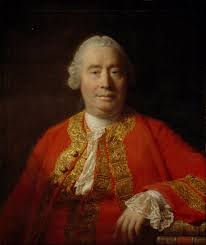
David Hume
1711-1776
“Money is not, properly speaking, one of the subjects of commerce; but only the instrument which men have agreed upon to facilitate the exchange of one commodity for another. It is none of the wheels of trade: It is theoilwhich renders the motion of the wheels moresmooth and easy,” (p.135 in Reader)
“If we consider any one kingdom by itself, it is evident, that the greater or less plenty of money is of no consequence; since the prices of commodities are always proportioned to the plenty of money”
Hume, David, 1752, “On Money” in Political Discourses
Mercantilism: Wrong on the Wealth of Nations I

Adam Smith
1723-1790
“We trust with perfect security that the freedom of trade, without any attention of government, will always supply us with the wine which we have occasion for: and we trust with equal security that it will always supply us with all the gold and silver which we can afford to purchase or to employ,”
Smith, Adam, 1776, An Enquiry into the Nature and Causes of the Wealth of Nations, (Book IV, Chapter 1: Of the Principle of the Mercantile System)
Mercantilism: Wrong on Trade

Adam Smith
1723-1790
“As every individual, therefore, endeavours as much as he can...to employ his capital [in] that industry that its produce may be of the greatest value; every individual necessarily labours to render the annual revenue of the society as great as he can. He generally, indeed, neither intends to promote the public interest, nor knows how much he is promoting it. By preferring the support of domestic to that of foreign industry...and by directing that industry in such a manner as its produce may be of the greatest value, he intends only his own gain, and he is in this, as in many other cases, led by an invisible hand to promote an end which was no part of his intention...By pursuing his own interest he frequently promotes that of the society more effectually than when he really intends to promote it..”
Mercantilism: Wrong on Managing Trade

Adam Smith
1723-1790
“The statesman, who should attempt to direct private people in what manner they ought to employ their capitals, would not only load himself with a most unnecessary attention, but assume an authority which could safely be trusted, not only to no single person, but to no council or senate whatever, and which would nowhere be so dangerous as in the hands of a man who had folly and presumption enough to fancy himself fit to exercise it.”
Smith, Adam, 1776, An Enquiry into the Nature and Causes of the Wealth of Nations, Book IV, Chapter 2: Of restraints upon the importation from foreign countries of such goods as can be produced at home
Mercantilism: Wrong on the Balance of Trade I

David Hume
1711-1776
- Explodes mercantilist “balance of trade” doctrine via his great “price-specie flow mechanism”:
“Suppose four-fifths of all the money in Great Britain be annihilated in one night...what would be the consequence? Must not the price of all labour and commodities sink in proprtion, and everything be sold as cheap? What nation could then dispute with us in any foreign market...which to us would afford sufficient profit? In how little time, therefore, must this bring back the money which we had lost, and raise us to the level of all the neighbouring nations? Where, after we arrived, we immediately lose the advantage of the cheapness of labour and commodities; and the farther flowing in of money is stopped by our fulness and repletion,” (pp.146-147 in Reader)
Hume, David, 1752, “Of the Balance of Trade” in Political Discourses
Mercantilism: Wrong on the Balance of Trade II

David Hume
1711-1776
- Gives the example inversely to underline the process:
“Again, suppose, that all the money of Great Britain were multiplied fivefold in a night, must not the contrary effect follow? Must not all labour and commodities rise to such an exorbitant height, that no neighbouring nations could afford to buy from us; while their commodities, on the other hand, became comparatively so cheap, that, in spite of all the laws which could be formed, they would be run in upon us, and our money flow out; till we fall to a level with foreigners, and lose that great superiority of riches, which had laid us under such disadvantages?” (p.147 in Reader)
Hume, David, 1752, “Of the Balance of Trade” in Political Discourses
Mercantilism: Wrong on the Balance of Trade III

Adam Smith
1723-1790
“Nothing, however, can be more absurd than this whole doctrine of the balance of trade, upon which, not only these restraints, but almost all the other regulations of commerce are founded. When two places trade with one another, this doctrine supposes that, if the balance be even, neither of them either loses or gains; but if it leans in any degree to one side, that one of them loses and the other gains in proportion to its declension from the exact equilibrium. Both suppositions are false. A trade which is forced by means of bounties and monopolies may be and commonly is disadvantageous to the country in whose favour it is meant to be established, as I shall endeavour to show hereafter. But that trade which, without force or constraint, is naturally and regularly carried on between any two places is always advantageous, though not always equally so, to both.”
Mercantilism: Wrong on The Balance of Trade IV
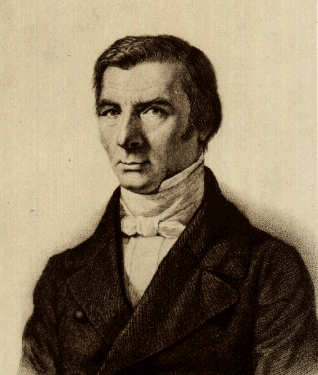
Frederic Bastiat
1801-1850
“[A]ccording to the theory of the balance of trade, France has a quite simple means of doubling her capital at any moment. It suffices merely to pass its products through the customhouse, and then throw them into the sea. In that case the exports will equal the amount of her capital; imports will be nonexistent and even impossible, and we shall gain all that the ocean has swallowed up,” (The Balance of Trade 1848).
Mercantilism: Wrong on The Balance of Trade V

Frederic Bastiat
1801-1850
“The truth is we should reverse the principle...and calculate the national profit from foreign trade in terms of the excess of imports over exports...But this theory, which is the correct one, leads directly to the principle of free trade...Assume, if it amuses you, that foreigners flood our shores with all kinds of useful goods, without asking anything from us; even if our imports are infinite and our exports nothing, I defy you to prove to me that we should be the poorer for it,” (The Balance of Trade 1848).
Mercantilism: Wrong on The Point of Production

Adam Smith
1723-1790
“Consumption is the sole end and purpose of all production; and the interest of the producer ought to be attended to only so far as it may be necessary for promoting that of the consumer. The maxim is so perfectly self-evident that it would be absurd to attempt to prove it. But in the mercantile system the interest of the consumer is almost constantly sacrificed to that of the producer; and it seems to consider production, and not consumption, as the ultimate end and object of all industry and commerce.”
Smith, Adam, 1776, An Enquiry into the Nature and Causes of the Wealth of Nations, Book IV, Chapter 9: Conclusion of the Mercantile system
Mercantilism: A Corporate Welfare Scheme I

Adam Smith
1723-1790
“It cannot be very difficult to determine who have been the contrivers of this whole mercantile system; not the consumers, we may believe, whose interest has been entirely neglected; but the producers, whose interest has been so carefully attended to; and among this latter class our merchants and manufacturers have been by far the principal architects.”
Smith, Adam, 1776, An Enquiry into the Nature and Causes of the Wealth of Nations, Book IV, Chapter 9: Conclusion of the Mercantile system
Mercantilism: A Corporate Welfare Scheme II

Frederic Bastiat
1801-1850
From the Manufacturers of Candles, Tapers, Lanterns, Candlesticks, Street Lamps, Snuffers and Extinguishers, and from the Producers of Tallow, Oil, Resin, Alcohol, and Generally of Everything Connected with Lighting.
To the Honorable Members of the Chamber of Deputes. We are suffering from the ruinous competition of a foreign rival who apparently works under conditions far superior to our own for the production of light that he is flooding the domestic market with it at an incredibly low price; for the moment he appears, our sales cease, all the consumers turn to him, and a branch of French industry whose ramifications are innumerable is all at once reduced to complete stagnation.
Bastiat, Frederic, 1845, The Candlemakers Petition.
Mercantilism: A Corporate Welfare Scheme III

Frederic Bastiat
1801-1850
We ask you to be so good as to pass a law requiring the closing of all windows, dormers, skylights, inside and outside shutters, curtains, casements, bulls'-eyes, deadlights, and blinds - in short, all openings, holes, chinks, and fissures through which the light of the sun is wont to enter houses, to the detriment of the fair industries with which, we are proud to say, we have endowed the country, a country that cannot, without betraying ingratitude, abandon us today to so unequal a combat.
[This will] encourage industry and increase employment...If you grant us a monopoly over the production of lighting during the day...we shall buy large amounts of tallow, charcoal, oil, resin, wax...and moreover, we and our numerous suppliers, having become rich, will consume a great deal and spread prosperity into all areas of domestic industry.
End the Artificial Restrictions I

Adam Smith
1723-1790
“Let the same natural liberty of exercising what species of industry they please, be restored to all his Majesty's subjects...break down the exclusive privileges of corporations, and repeal the statute of apprenticeship, both which are real encroachments upon natural liberty, and add to these the repeal of the [anti-migration laws] so that a poor workman, when thrown out of employment either in one trade or in one place, may seek for it in another trade or in another place without the fear either of a prosecution or of a removal.”
End the Artificial Restrictions II

Adam Smith
1723-1790
“The natural effort of every individual to better his own condition...is so powerful, that it is alone, and without any assistance, not only capable of carrying on the society to wealth and prosperity, but of surmounting a hundred impertinent obstructions with which the folly of human laws too often encumbers its operations.”
Smith, Adam, 1776, An Enquiry into the Nature and Causes of the Wealth of Nations, Book IV, Chapter V
Mercantilism: Wrong on Colonies I

Adam Smith
1723-1790
“Of all those expensive and uncertain projects, however, which bring bankruptcy upon the greater part of the people who engage in them, there is none perhaps more ruinous than the search after new silver and gold mines. It is perhaps the most disadvantageous lottery in the world, or the one in which the gain of those who draw the prizes bears the least proportion to the loss of those who draw the blanks: for though the prizes are few and the blanks many, the common price of a ticket is the whole fortune of a very rich man.”
Mercantilism: Wrong on Colonies II

Adam Smith
1723-1790
”Folly and injustice seem to have been the principles which presided over and directed the first project of establishing those colonies; the folly of hunting after gold and silver mines, and the injustice of coveting the possession of a country whose harmless natives, far from having ever injured the people of Europe, had received the first adventurers with every mark of kindness and hospitality.”
Smith, Adam, 1776, An Enquiry into the Nature and Causes of the Wealth of Nations, Book IV, Chapter VII, Part I: Of the Motives for establishing new Colonies
Mercantilism: Wrong on Colonies III

Adam Smith
1723-1790
“To prohibit a great people, however, from making all that they can of every part of their own produce...is a manifest violation of the most sacred rights of mankind. Unjust, however, as such prohibitions may be, they have not hitherto been very hurtful to the colonies...
“We must carefully distinguish between the effects of the colony trade and those of the monopoly of that trade. The former are always and necessarily beneficial; the latter always and necessarily hurtful. But the former are so beneficial that the colony trade, though subject to a monopoly, and notwithstanding the hurtful effects of that monopoly, is still upon the whole beneficial, and greatly beneficial; though a good deal less so than it otherwise would be...Under the present system of management, therefore, Great Britain derives nothing but loss from the dominion which she assumes over her colonies.”
Mercantilism: Wrong on Slavery

Adam Smith
1723-1790
“Fortune never exerted more cruelly her empire over mankind, than when she subjected those nations of heroes to the refuse of the jails of Europe, to wretches who possess the virtues neither of the countries which they come from, nor of those which they go to, and whose levity, brutality, and baseness, so justly expose them to the contempt of the vanquished.”
Smith, Adam, 1749, Theory of Moral Sentiments, Part V, Chapter 2: Of the Influence of Custom and Fashion upon Moral Sentiments
Adam Smith on The System of Natural Liberty

Adam Smith
1723-1790
“It is thus that every system which endeavours, either by extraordinary encouragements to draw towards a particular species of industry a greater share of the capital of the society than what would naturally go to it, or, by extraordinary restraints, force from a particular species of industry some share of the capital which would otherwise be employed in it, is in reality subversive of the great purpose which it means to promote. It retards, instead of accelerating, the progress of the society towards real wealth and greatness; and diminishes, instead of increasing, the real value of the annual produce of its land and labour.”
Smith, Adam, 1776, An Enquiry into the Nature and Causes of the Wealth of Nations, Book IV, Chapter IX: Of the Agricultural Systems, or of those Systems of Political Œconomy which Represent the Produce of Land as either the Sole or the Principal Source of the Revenue and Wealth Every Country
]
Adam Smith on The System of Natural Liberty

Adam Smith
1723-1790
“All systems either of preference or of restraint, therefore, being thus completely taken away, the obvious and simple system of natural liberty establishes itself of its own accord. Every man, as long as he does not violate the laws of justice, is left perfectly free to pursue his own interest his own way, and to bring both his industry and capital into competition with those of any other man, or order of men. The sovereign is completely discharged from a duty, in attempting to perform which he must always be exposed to innumerable delusions, and for the proper performance of which no human wisdom or knowledge could ever be sufficient; the duty of superintending the industry of private people, and of directing it towards the employments most suitable to the interest of the society,"
Adam Smith on The System of Natural Liberty

Adam Smith
1723-1790
“According to the system of natural liberty, the sovereign has only three duties to attend to; three duties of great importance, indeed, but plain and intelligible to common understandings: first, the duty of protecting the society from violence and invasion of other independent societies; second, the duty of protecting, as far as possible, every member of the society from the injustice or oppression of every other member of it, or the duty of establishing an exact administration of justice; and, third, the duty of erecting and maintaining certain public works and certain public institutions which it can never be for the interest of any individual, or small number of individuals, to erect and maintain; because the profit could never repay the expense to any individual or small number of individuals, though it may frequently do much more than repay it to a great society.”
]
Adam Smith on Free Trade

Adam Smith
1723-1790
“If a foreign country can supply us with a commodity cheaper than we ourselves can make it, better buy it of them with some part of the produce of our own industry, employed in a way in which we have some advantage...It is certainly not employed to the greatest advantage, when it is thus directed towards an object which it can buy cheaper than it can make...The industry of the country, therefore, is thus turned away from a more, to a less advantageous employment, and the exchangeable value of its annual produce...must necessarily be diminished by ever regulation”
Smith, Adam, 1776, An Enquiry into the Nature and Causes of the Wealth of Nations, (Book IV, Chapter 1: Of the Principle of the Mercantile System)
Adam Smith on Free Trade

Adam Smith
1723-1790
“Between whatever places foreign trade is carreid on, they all of them derive two distinct benefits from it. [Trade allows them to] satisfy a part of their wants, and increase their enjoyments. [Second], by opening a more extensive market for whatever part of the produce of their labour may exceed home consumption, it encourages them to improve its productive powers, and to augment its annual produce to the utmost, and thereby to increase the real revenue and wealth of society.”
Smith, Adam, 1776, An Enquiry into the Nature and Causes of the Wealth of Nations, (Book IV, Chapter 1: Of the Principle of the Mercantile System)
Adam Smith: Two Exceptions to Free Trade

Adam Smith
1723-1790
- Smith gave two exceptions for when we should not have free trade:
“The first is when some particular sort of industry is necessary for the defense of the country...Defense...is of much more importance than opulence”
- The second is when domestic goods are subject to taxes not levied on imported goods; imposing equivalent tariffs equalize the tax base
“[Such a tariff] would leave the competition between foreign and domestic industry, after the tax, as nearly as possible upon the same footing as before it.”
Smith, Adam, 1776, An Enquiry into the Nature and Causes of the Wealth of Nations, (Book IV, Chapter 1: Of the Principle of the Mercantile System)
Adam Smith: Strategic Trade Policy

Adam Smith
1723-1790
“[I]t may sometimes be a matter of deliberation [how to remove tariffs] when some foreign nation restrains by high duties or prohibitions the importation of some of our manufactures into their country. Revenge in this case naturally dictates retaliation, and that we should impose the like duties and prohibitions upon the importation of some or all of their manufactures into our country...nations accordingly seldom fail to retaliate in this manner.”
“There may be a good policy in retaliations of this kind...The recovery of a great foreign market will generatlly more than compensate the transitory inconveniency of paying dearer during a short time for some sorts of goods. To judge whether such retaliations are likely to produce such an effect...[belongs] to the skill of that insidious and crafty animal, vulgarly called the statesman or politician, whose councils are directed by the momentary fluctuations of affairs.”
Smith, Adam, 1776, An Enquiry into the Nature and Causes of the Wealth of Nations, (Book IV, Chapter 2
James Mill on Free Trade

James Mill
1773-1836
“The commerce of one country with another, is in fact merely an extension of that division of labour by which so many benefits are conferred upon the human race. As the same country is rendered the richer by the trade of one province with another; as its labour becomes thus infinitely more divided, and more productive than it otherwise have been; and as the mutual supply to each other of all the accommodations which one province has and another wamts, multiplies the accommodations of the whole, and the country becomes thus in a wonderful degree more opulent and happy; the same beautiful train of consequences is observable in the world at large...The labour of the human race thus becomes much more productive, and every species of accommodation is afforded in much greater abundance”
Mill, James, 1808, Commerce Defended
James Mill: Imports are Benefits, Exports are Costs

James Mill
1773-1836
“If we import, we must pay for what we import, with the produce of a portion of our labour exported. But why not employ that labour in raising the same portion at home? The answer is, because it will procure more [goods] by going in the shape of commodities to purchase [goods] abroad, than if it had been employed in raising it at home...A law, therefore, to prevent the importation of [goods], can have only one effect,—to make a greater portion of the labour of the community necessary for the production of its [goods].”
“The benefit which is derived from exchanging one commodity for another, arises, in all cases, from the commodity received, not from the commodity given...[A country] gains nothing in parting with its commodities.” (1821, Outline of Political Economy)
Mill, James, 1814, Corn Laws
John Stuart Mill: The Cosmopolitanism of Free Trade
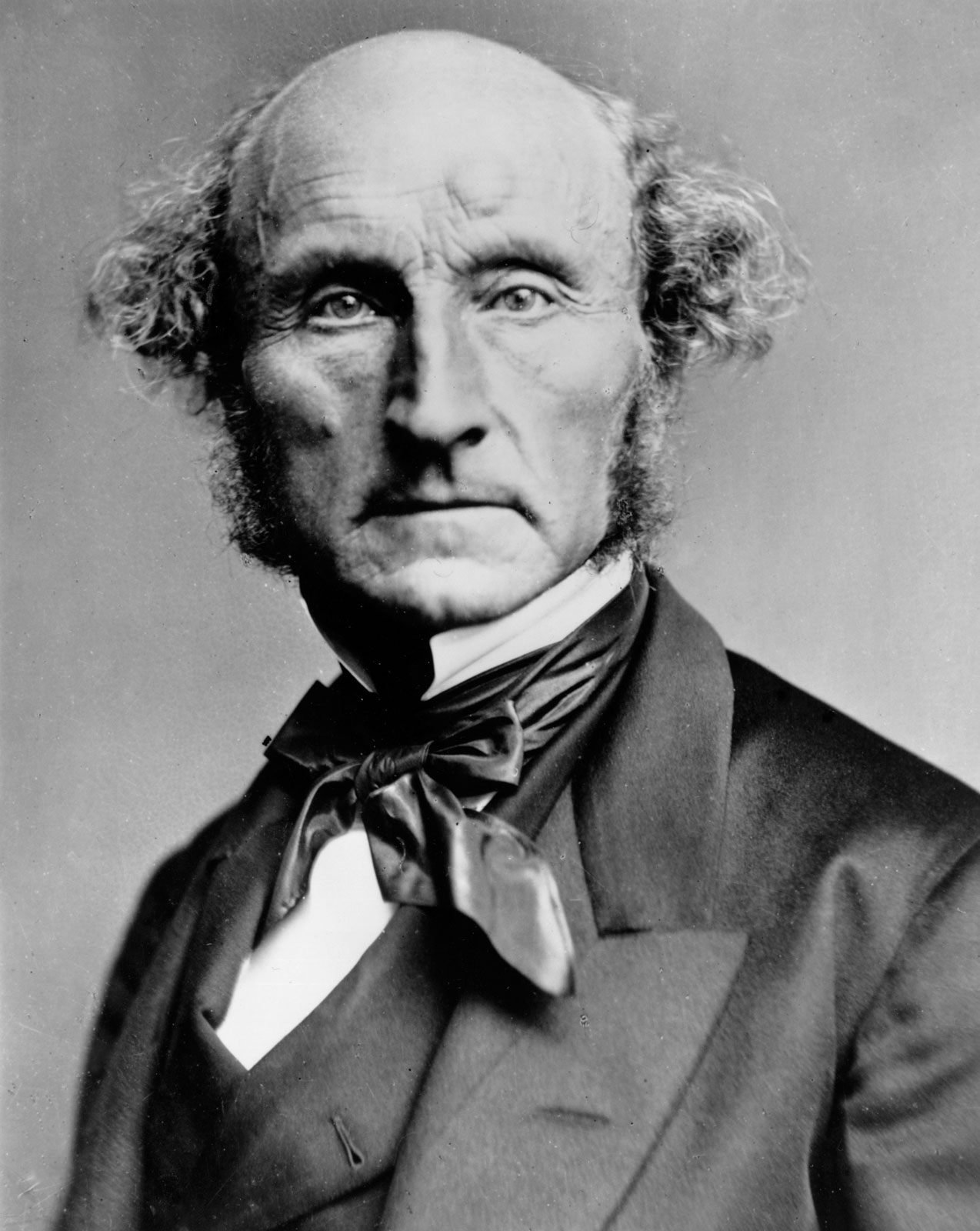
John Stuart Mill
1806-1873
“[T]he economical benefits of commerce are surpassed in importance by those of its effects which are intellectual and moral. IT is hardly possible to overrate the value, for the improvement of human beings, of things which bring them into contact with persons dissimilar to themselves, and with modes of thought and action unlike those with which they are familiar...it is indispensable to be perpetually comparing [one’s] own notions and customs with the experience and example of persons in different circumstances...there is no nation which does not need to borrow from others”
Mill, John Stuart, 1825, The Corn Laws
John Stuart Mill: The Costs of Protectionism

John Stuart Mill
1806-1873
“[Domestic protection would] render the labour and capital of the country less efficient in production than they would otherwise be; and compel a waste...All is sheer loss, to the country as well as to the consumer.”
“The alternative is not between employing our own country-people and foreigners, but between employing one class and another of our own country-people [because] the imported commodity is always paid for, directly or indirectly, with the produce of our own industry.”
Mill, John Stuart, 1825, The Corn Laws
The Corn Laws
The Corn Laws
Britain, long an exporter of corn, with population growth was no longer self-sufficient, became a net importer of corn after 1790
- “Corn” = grains, wheat, barley, corn, etc.
Corn prices (and land rents) rising rapidly
| Period | Price per quarter ton |
|---|---|
| 1770-1779 | 45 shillings |
| 1780-1789 | 45 shillings |
| 1790-1799 | 55 shillings |
| 1800-1809 | 82 shillings |
| 1810-1813 | 106 shillings |

The Corn Laws
Britain at war with France in Napoleonic Wars (1803-1815)
Further disrupting imports of corn into Britain (and further raising corn prices)
- and artificially protecting British corn producers from cheaper foreign competition
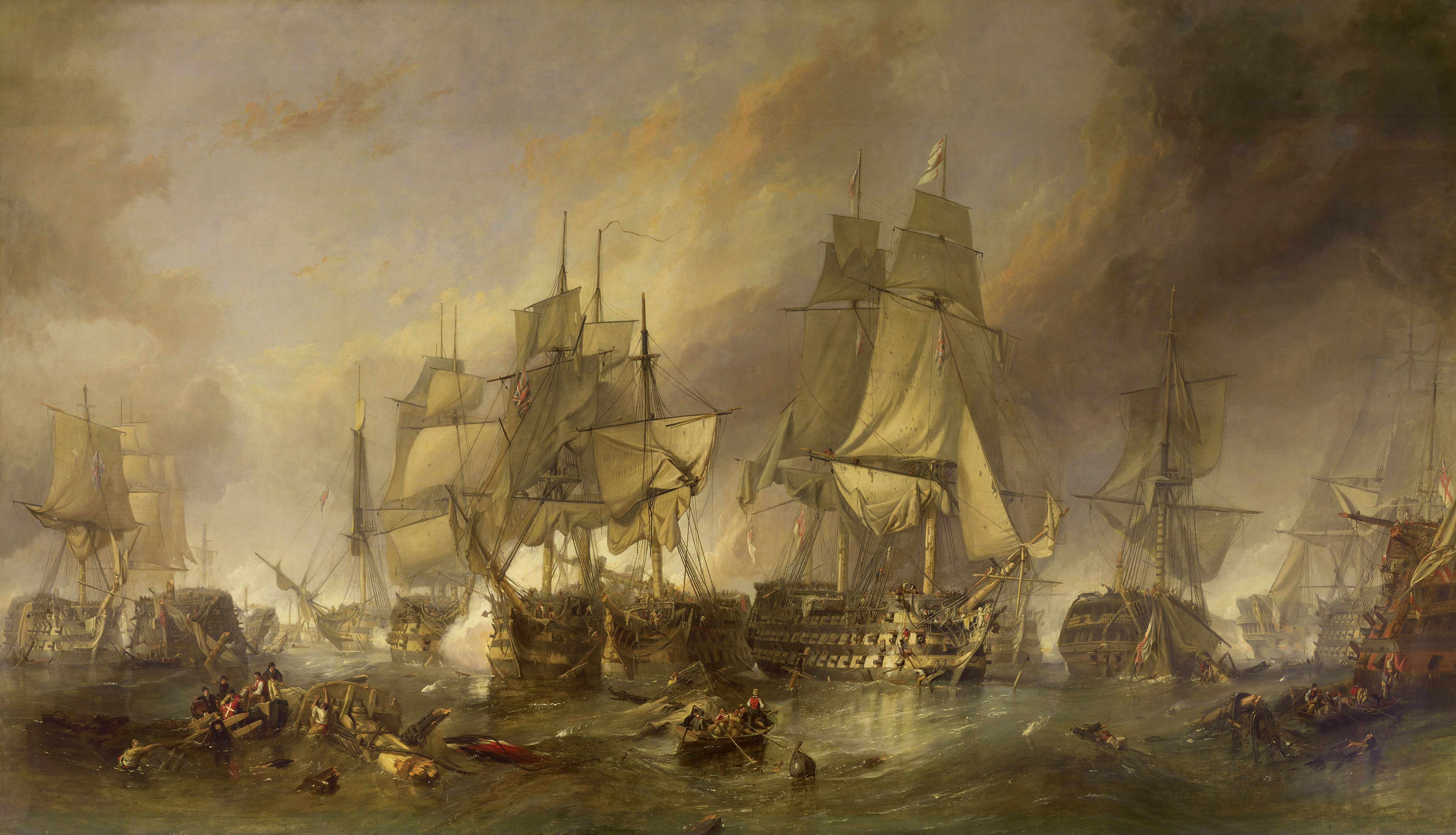
The Corn Laws
Landlords, fearing the end of the war, petitioned Parliament to get legal protection from cheaper, imported Corn
The Corn Laws: a series of tariffs and price floors by Parliament
- 1791: Floor at 50 shillings
- 1803: Floor at 63 shillings
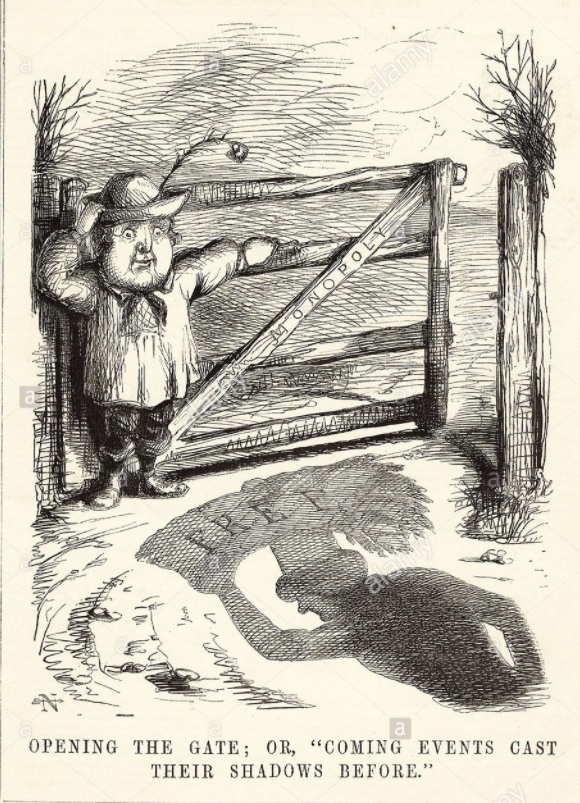
The Corn Laws
Landlords argues high tariffs will keep grain prices low
- Encourages greater investment in British agriculture, increasing supply which would lower prices
Also argue that it corn prices allowed to fall, land would no longer be cultivated, leading to a greater shortage of corn than ever

Thomas Malthus: In Favor of the Corn Laws
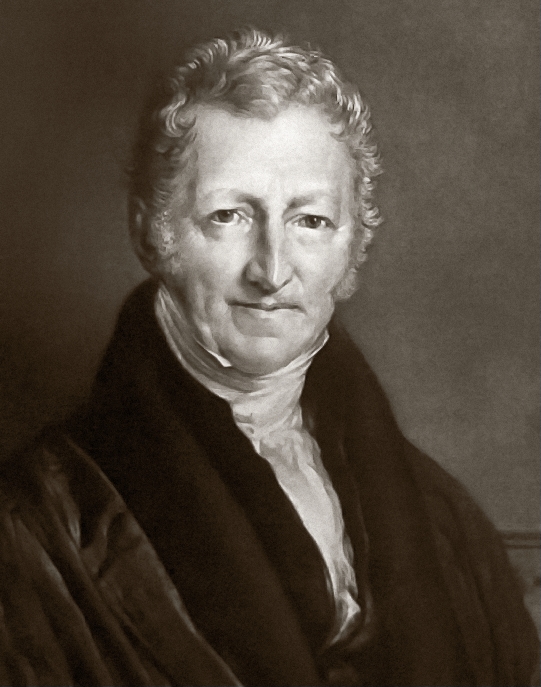
Thomas Robert Malthus
1766-1834
Famous for his “population principle” and debates with David Ricardo
Only Classical Economist to defend the Corn Laws, on two grounds:
- “National security”: Britain should not depend on other countries for her food supply; in bad times, they will feed themselves and not export to Britain
- A sudden fall in Corn prices would destabilize the British economy
Malthus, Thomas, 1814, Observations on the Effects of the Corn Laws
1815, The Grounds of an Opinion on the Policy of Restricting the Importation of Foreign Corn
Opposition to the Corn Laws
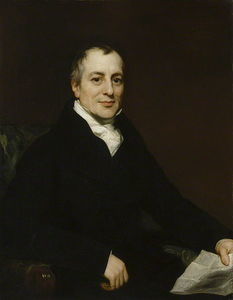
David Ricardo
1772-1823
“If the interests of the landlord be of sufficient consequence, to determine us not to avail ourselves of all the benefits which would follow from importing corn at a cheap price, they should also influence us in rejecting all improvements in agriculture, and in the implements of husbandry; for it is as certain that corn is rendered cheap, rents are lowered, and the ability of the landlord to pay taxes, is for a time, at least, as much impaired by such improvements, as by the importation of corn. To be consistent then, let us by the same act arrest improvement, and prohibit importation.”
- 👆 satire!
Ricardo, David, 1815, Essay on the Influence of a Low Price of Corn on the Profits of Stock
Comparative Advantage

Col. Robert Torrens
1780—1864
“Let us suppose, that there are, in England, unreclaimed districts, from which corn might be raised at as small an expense of labour and capital, as from the fertile plains of Poland. This being the case, and all other things the same, the person who should cultivate our unreclaimed districts, could afford to sell his produce at as cheap a rate as the cultivator of Poland; and it seems natural to conclude, that if industry were left to take its most profitable direction, capital would be employed in raising corn at home, rather than bringing it in from Poland at an equal prime cost, and at much greater expense of carriage.”
Torrens, Robert, 1815, Essay on the External Corn Trade
Comparative Advantage

Col. Robert Torrens
1780—1864
“But this conclusion, however obvious and natural it may, at first sight, appear, might, on closer examination, be found entirely erroneous. If England should have acquired such a degree of skills in manufacturews, that, with any given portion of her capital, she could prepare a quantity of cloth, for which the Polish cultivator would give a greater quantity of corn, than she [England] could, with the same portion of capital, raise from her own soil, then, tracts of her territory, though they should be equal, nay, even though they should be superior, to the lands in Poland, will be neglected; and a part of her supply of corn will be imported from that country.”
Torrens, Robert, 1815, Essay on the External Corn Trade
Ricardian Comparative Advantage

David Ricardo
1772-1823
“To produce the wine in Portugal, might require only the labour of 80 men for one year, and to produce the cloth in the ame country, might require the labour of 90 men for the same time. It would therefore be advantageous for her to export wine in exchange for cloth. This exchange might even take place, notwithstanding that the commodity imported by Portugal could be produced there with less labour than in England. Though she could make the cloth with the labour of 90 men, she would import it from a country where it required the labour of 100 men to produce it, because it would be advantageous to her rather to employ her capital in the production of wine, for which she would obtain more cloth from England, than she could produce by diverting a portion of her capital from the cultivation of vines to the manufacture of cloth.”
Ricardo, David, 1817, Principles of Political Economy and Taxation
Ricardian Comparative Advantage

David Ricardo
1772-1823
Maximum Possible Production
| Wine | Cloth | |
|---|---|---|
| England | 5 | 10 |
| Portugal | 4 | 2 |
Opportunity Costs
| 1 Wine | 1 Cloth | |
|---|---|---|
| England | 2c | 0.5w |
| Portugal | 0.5c | 2w |
Ricardian Comparative Advantage

David Ricardo
1772-1823
Even in the presence of absolute advantage (one country is more efficient at producing all goods), still better for them to specialize
- A high opportunity cost of producing everything
Pay others to perform a task, or purchase a good, and specialize in producing goods where you have the lowest opportunity cost
This is the principle of comparative advantage
Ricardo called this the principle of “comparative cost”; Torrens calls it “comparative advantage” (and to be fair, Torrens wrote about it first)
- in favor of free trade (import cheaper corn!)
- preventing imports is like preventing superior production at home!
James Mill on Comparative Advantage

James Mill
1773-1836
“When a country can either import a commodity or produce it at home, it compares the cost of producing at home with the cost of procuring from abroad; if the latter cost is less than the first, it imports. The cost at which a country can import from abroad depends, not upon the cost at which the foreign country produces the commodity, but upon what the commodity costs which it sends in exchange, compared with the cost which it must be to produce the commodity in question, if it did not import it.”
Mill, James, 1821, Elements of Political Economy
The Corn Laws
Another claim that high prices were caused by high rents
- Ricardo disgreed: believed rent was price-determined, not price-determining
Ricardo concerned about how high tariffs would affect economic distribution in society: clearly favors landlords at others’ expense
- Smith wasn’t clear enough on this
Clear how the Corn Laws controversy forced Ricardo to think about these issues and build his own theory...

John Stuart Mill: The Costs of Protectionism

John Stuart Mill
1806-1873
“[I]f there were nothing in the whole process but a transfer; if whatever is lost by the consumer and by the capitalist were gains by the landlord; there might be robbery, but there would not be waste, there might be a worse distribution of the national wealth, but there would be no positive diminution of this aggregate wealth.”
“[But the Corn Laws] occasion in all cases an absolute loss, greatly exceeding the gain which can be derived from them by the receivers of rent; and for every pound which finds its way in the pockets of the landlords...the community is robbed of several.”
Mill, John Stuart, 1825, The Corn Laws
John Stuart Mill: The Costs of Protectionism

John Stuart Mill
1806-1873
“It would be better, however, to have a repeal of the Corn Laws, even clogged by a compensation [to landlords], than to not [repeal] at all; and if [reapeal with compensation to landlords] were our only alternative, no one could complain of a chance, by which, though an enormous amount of evil would be prevented, no one would lose.”
Mill, John Stuart, 1825, The Corn Laws
The Corn Laws Controversy...into the 1840s
Corn Laws remained a huge political issue in England in 1830s-1840s
Industralization, rising population, but rising price of bread
Great Famine in Ireland 1845-1849
Radical liberals Richard Cobden & John Bright create the Anti-Corn Law League 1838
- large rallies, major riots in London
- Classical economists wrote vehemently against Corn Laws
A Meeting of the Anti-Corn Law League
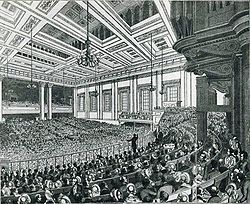
The Corn Laws Controversy...into the 1840s
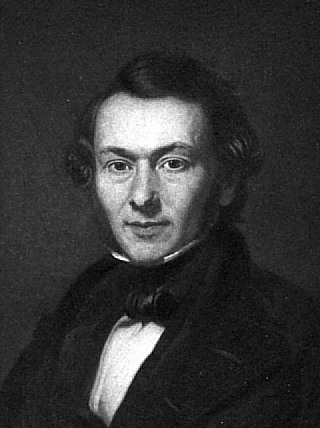
Richard Cobden
1804-1865
"[Repealing the Corn laws would solve four problems.] First, it would guarantee the prosperity of the manufacturer by affording him outlets for his products. Second, it would relieve the Condition of England question by cheapening the price of food and ensuring more regular employment. Third, it would make English agriculture more efficient by stimulating demand for its products in urban and industrial areas. Fourth, it would introduce through mutually advantageous international trade a new era of international fellowship and peace. The only barrier to these four beneficent solutions was the ignorant self-interest of the landlords, the "bread-taxing oligarchy, unprincipled, unfeeling, rapacious and plundering."
The Corn Laws Controversy...into the 1840s
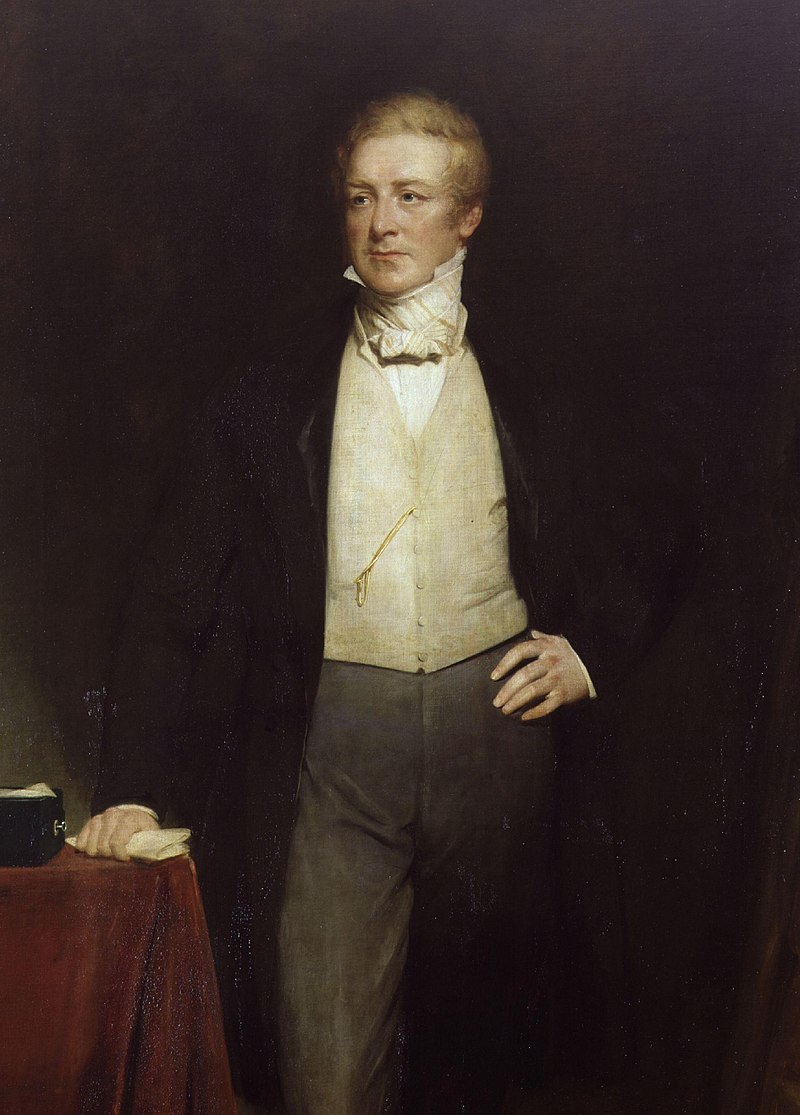
Robert Peel
1788-1850
Tory Robert Peel becomes P.M. 1841-1846
Repeals the Corn Laws in 1846
- ruins his political career
- splits the Tory Party into the Whigs; radicals leave and become the Liberal Party
Price of corn plummets
- working classes can now afford food, more shift from farms to factories
- last vestiges of feudal privileges eroding
The Corn Laws Controversy...into the 1840s
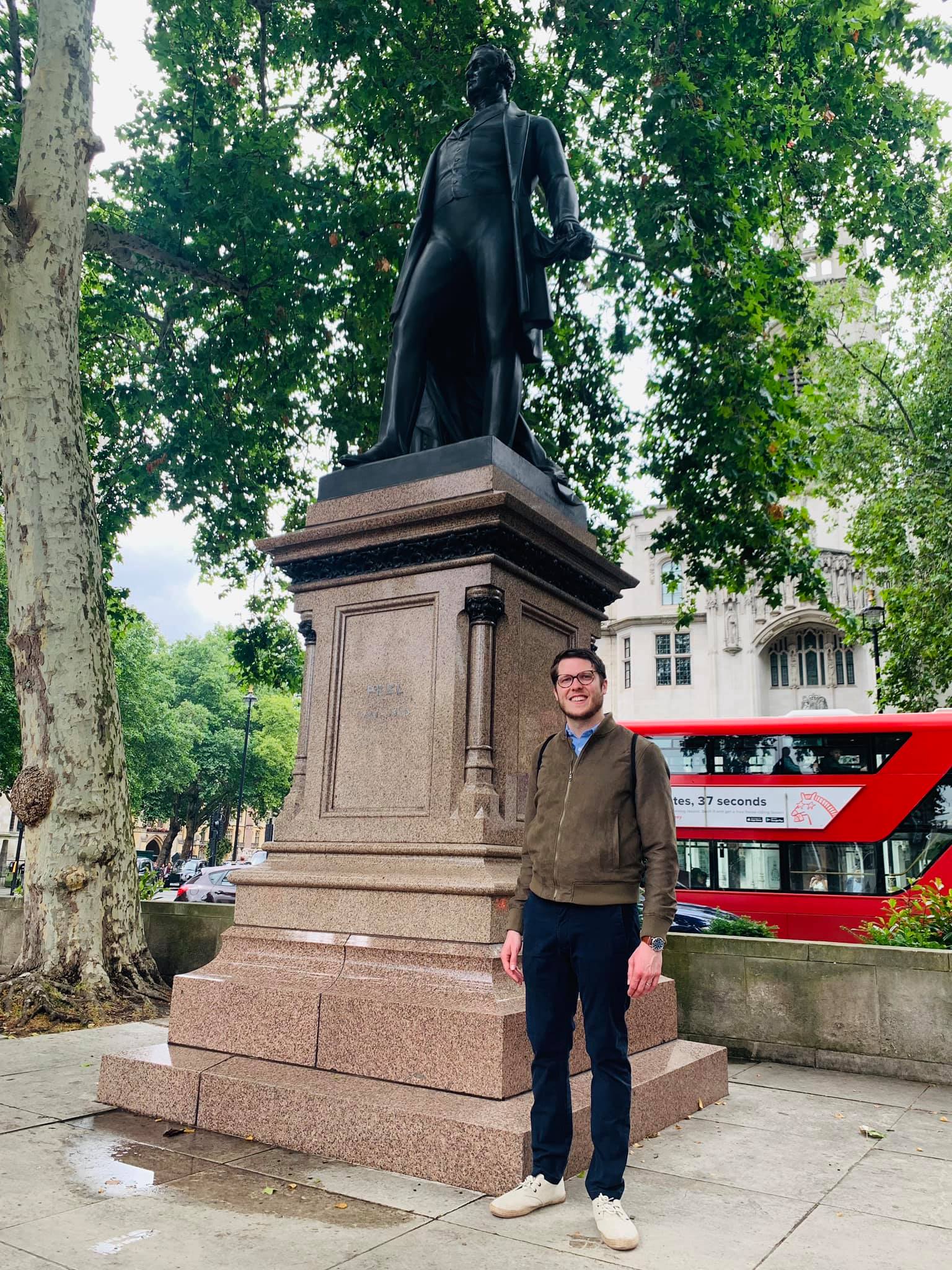
Tory Robert Peel becomes P.M. 1841-1846
Repeals the Corn Laws in 1846
- ruins his political career
- splits the Tory Party into the Whigs; radicals leave and become the Liberal Party
Price of corn plummets
- working classes can now afford food, more shift from farms to factories
- last vestiges of feudal privileges eroding